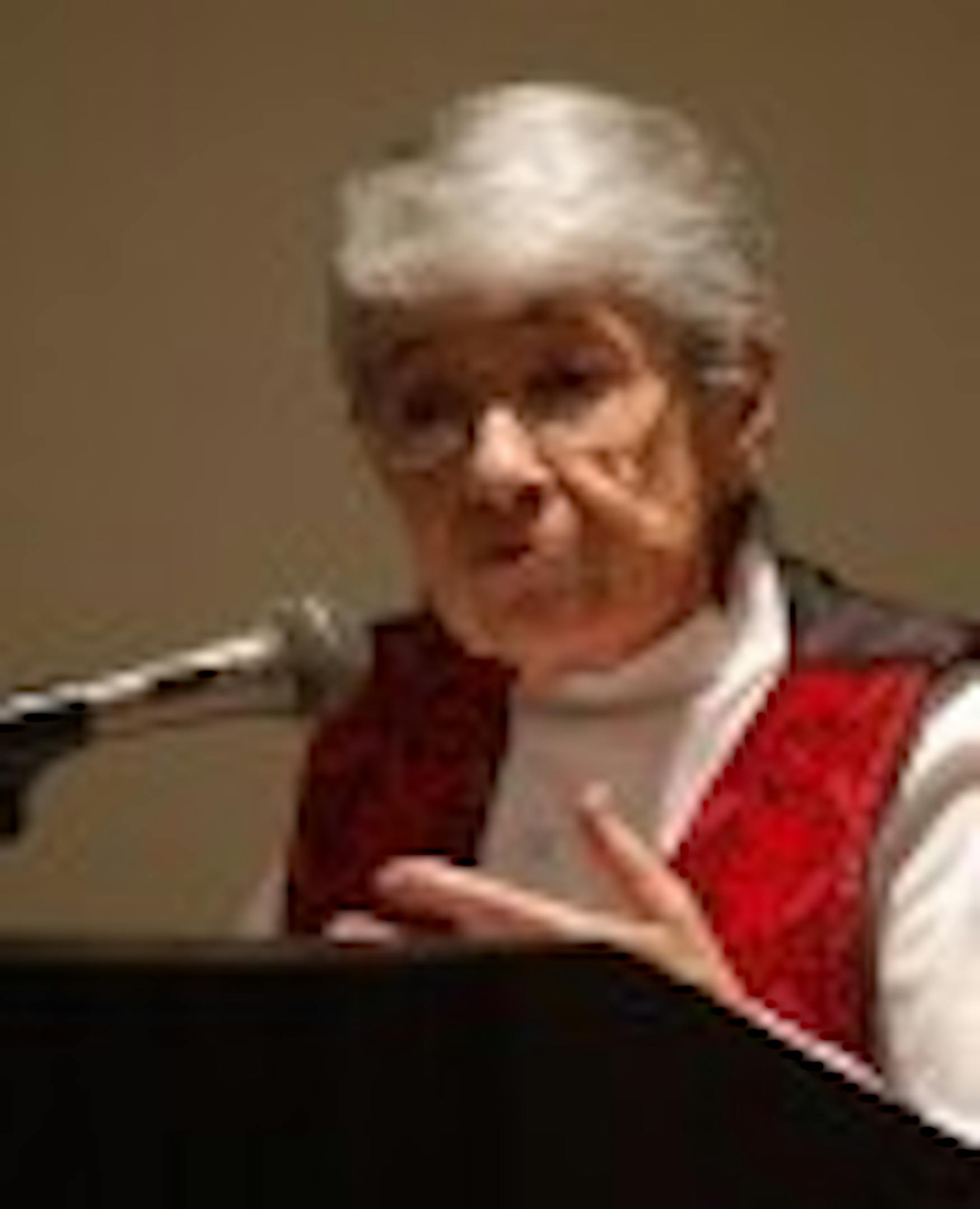Hedy Epstein discusses Israel's policies
Hedy Epstein, a political activist and refugee from Nazi Germany, addressed Brandeis students and community members last Thursday about her experience focusing on Palestine solidarity work in the West Bank, where she has visited several times since 2003. Jewish Voice for Peace; Students for Justice in Palestine; and the Peace, Conflict and Coexistence Studies program sponsored the event.
Epstein said she was born in Germany in 1924 to Jewish, anti-Zionist parents and fled Germany on a kindertransport, a transport of Jewish children designed to prevent them from encountering Nazi persecution, to England before World War II began. She said because of her parents' influence, she too was an anti-Zionist. Much of her family perished at Auschwitz, a concentration camp, during the Holocaust.
Epstein said that her first visit to the West Bank occurred in December 2003, when she and several friends traveled there for the first time. While in the West Bank, Epstein said she participated in many "nonviolent protests" against the Israeli military and its occupation of the West Bank. She cited one example in which she marched with Palestinians and Israelis to protest the security barrier that was constructed by Israel, and said that Israeli soldiers fired on the group and wounded an Israeli citizen and other protesters.
Epstein said, "The demonstrations are always peaceful on the part of the Palestinians, the Israelis and the internationals. The violence is always on the part of the Israeli soldiers."
Epstein also criticized the Israeli military checkpoints, which are imposed on people entering and exiting the West Bank.
She reported that at one checkpoint, for example, she once saw an Israeli soldier use his gun to bang on the casts a young boy was wearing on both his legs and one of his arms. Epstein said she told the soldier to stop and the soldier replied, "Shut up." The soldier offended Epstein and she told the room of Brandeis students, "Maybe if I had been his peer, it [saying "Shut up"] would have been semi-appropriate, but even then it wouldn't have been, I think."
When asked by a student during a question-and-answer session why she thinks Israel instituted a blockade of Gaza, Epstein said of the Israeli government, "I think sometimes I have the feeling they must sit up at night and figure out what can we do to hurt and to harm and to restrict freedoms for the Palestinians, because they keep on coming up with new ideas [of] how they can restrict the livelihood of the Palestinians."
Epstein announced that another flotilla with contingents from many different countries is being planned for March 2011. She plans to be aboard a U.S. boat to Gaza.
Concerning the right for a Jewish state to exist, she said, "I am not fighting what exists and has existed since 1948. But it needs to be a different kind of a state. It needs to be a state where all people living in that state have equal rights."
Epstein was asked to explain her view of Hamas, an Islamic militant group that won elections in Gaza in 2006. Epstein said, "Hamas was democratically elected with international supervision, so they have the right to have whatever they have. I have to recognize it; whether I like it or don't like it doesn't matter." Regarding the fact that Hamas has been deemed by some to be a terrorist organization, she said, "That has been arbitrarily decided by the United States and Israel."
With regards to U.S. President Barack Obama's role in the peace talks, Epstein recommended that Obama remember his once "very close relationship with Edward Said." Said was a Palestinian American political activist who supported the Palestinian cause and advocated for Palestinian statehood. Epstein stated that Obama should consider Said's opinions when dealing with the Middle East.
Prof. Gordon Fellman (SOC), chair of the Peace, Conflict and Coexistence Studies program said in an interview with the Justice after the event that he was willing to sponsor the event because he was convinced that Epstein acknowledged the national aspirations of both the Palestinians and the Israelis.
Fellman asserted that students entered the event with set beliefs and were not willing to learn anything new. He said, "I thought it was a classic frozen format. . Part of what is sad about this as a university is that there is very little learning going on, there is very little listening going on."
Sarah Geller '13, president of Brandeis Israel Public Affairs Committee, said, "I think she is very one-sided and does not understand the whole context of the situation. . For a lot of the scenarios that she presented, there is definitely another valid side."
Elisha Baskin (GRAD) said, "I think that she is a very brave woman to be both Jewish and have a background, her family background, and being a Holocaust survivor, to be able to speak this voice is just incredible that she has the courage and the time to talk to people about it."
Lev Hirschhorn '11, co-founder of Jewish Voice for Peace, noted, "Hedy is an activist and she stated her opinions-what she saw and what she felt- and people listened, and I think that is what matters.




Please note All comments are eligible for publication in The Justice.